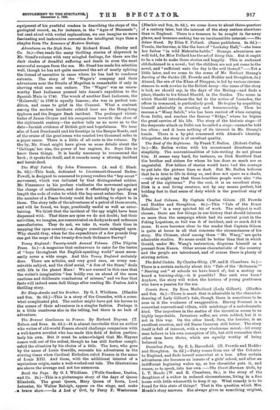Basil the Page. By G. L Whitham. (Wells Gardner, Dalton,
and Co. 2s.)—This is a picturesque story of the days of Queen Elizabeth. The great Queen, Mary Queen of Scots, Lord Leicester, Sir Walter Raleigh, appear on the stage, and make
brave show.—In 4 Lad of Grit, by Percy F. Westerman
(Blackie and Son, 2s. 6d.), we come down to about three-quarters of a century later, but the interest of the story centres elsewhere than in England. There is a treasure to be sought in far-away places, and treasure-seeking has an inexhaustible interest.—The Saver Hand. By Eliza F. Pollard. (Same publishers. 2s. 6d.)— Ursula, the heroine, is like the hero of "Locksley Hall,"—she loses her father "in wild Mahratta-battlo." Strange adventures are well told, for Miss Pollard has the art of doing this. But it ought to be a rule to make these stories end happily. This is reckoned old-fashioned in a novel; but the children are not yet come to the novel, and "sufficient unto the day is the evil thereof."—Yet a little later, and we come to the scene of Mr. Herbert Strang's Barclay of the Guides (H. Frowde and Hodder and Stoughton, 5s.) Ahmed, the son of the Khan of Sliagpur, is led by various circum- stances to seek service in the British Army—the scene of the story is laid, we should say, in the days of the Mutiny—and finds a place, thanks to his friend Sherdil, in the Guides. The scene in which Sherdil introduces the lad to the notice of Lumsden, the officer in command, is particularly good. He begins by acquitting himself admirably in shooting and horsemanship. Then he rescues a "Missy Sahib," who has been carried off when escaping from Delhi, and reaches the famous "Ridge," where he begins the great service of his life. The story of the historic siege—if the desperate attack on Delhi can be called a siege—cannot be told too often ; and it loses nothing of its interest in Mr. Strang's hands. There is a by-plot concerned with Ahmed's identity. Altogether, the story is of excellent quality.






































































 Previous page
Previous page